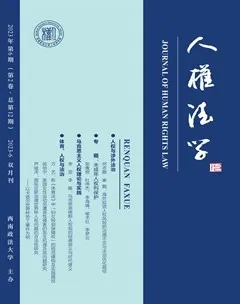On Governance Weakness and Legislative Path in Responding to Human Rights Risks of Overseas Investment
2023-04-29HEZhipeng,CUIPeng
HE Zhipeng, CUI Peng
Abstract: Human rights risk is a new risk encountered by Chinese enterprises in overseas investment, which is different from traditional risks such as economic and political risks. Chinese enterprises investing overseas face direct human rights risks caused by violations in human rights laws and regulations, and need to deal with indirect human rights risks. Indirect human rights risk mainly comprise of the risks as follows: the one caused by some Western countries in having human rights as ideological weapons to attack Chinese enterprises, the one of being accused of "silent complicity" when investing in countries or regions with political instability and high incidence of human rights problems, and the one transformed from traditional risks such as political risk and economic risk. However, in managing the human rights risk of overseas investment, the government and enterprises must take more feasible and firm steps to respond. The rule of law in foreign affairs is Chinas primary strategy in the rule of law and in foreign affairs, which deals with foreign law related risks and safeguards national sovereignty, security, and development interests. It is theoretically qualified for China to deal with the human rights risk of overseas investment with the concept and principle of the rule of law in foreign affairs. In the past, although the legislation in foreign affairs has made some achievements, questions still need to be answered in responding to the human rights risk of overseas investment, ignoring applying the concept and principle of the rule of law in foreign affairs. On the one hand, enterprises with overseas investment lack awareness of law, human rights, social responsibility, and risk prevention. In overseas investment practices, they do not entirely understand the law, do not know how to abide by it, and use it to protect their rights. They may fall into the troubles of direct human rights risk because they violate laws and regulations related to human rights protection, and they may fall into the troubles of indirect human rights risk because they pay little attention to human rights protection and related risks. On the other hand, the government should strengthen legislation and governance in foreign affairs. Otherwise, it will not only objectively increase the possibility of enterprises encountering human rights risk but also the difficulty in providing adequate relief when enterprises are caught in human rights risk. Therefore, it is necessary to give better play to the value of the rule of law in foreign affairs and explore the path of the rule of law to optimize the solutions to human rights risk in overseas investment, accelerate the strategic plan of the rule of law in foreign affairs, and promote the coordination of the rule of law in domestic and foreign affairs; improve good laws concerning foreign affairs, ensure good governance with good laws, optimize good governance concerning foreign affairs, and implement good laws with good governance. It is necessary to improve the governments capability to manage and serve overseas investment enterprises while balancing the dual functions of management and service; improve the ability of cooperation and contention by the rule of law in foreign affairs; and comprehensively apply the dual paradigm of cooperation and contention. Meanwhile, we should correctly handle the relationship between cooperation and contention to avoid the possibility of a zero-sum game. We should not only pay attention to risk prevention by the rule of law in advance but also be prepared for judicial relief afterward, so as to provide the dual guarantee of the rule of law for enterprises with overseas investment: risk prevention and judicial relief, in response to the human rights risk of overseas investment precauciously and effectively.
KEY WORDS: overseas investment; human rights risks; governance; the rule of law in foreign affairs
杂志排行
人权法学的其它文章
- 《人权法学》征稿启事
- A Study of the Legitimacy of FIFA
- 本刊介绍
- A Study on the Reasons and Problems of Sexual Abuses on American Female Athletes
- The Normative Construction and Implementation Path of "The Right to Special Guarantee for Women" in the New Law of the People
- The Classical Semantics and Contemporary Significance of Karl Marx
